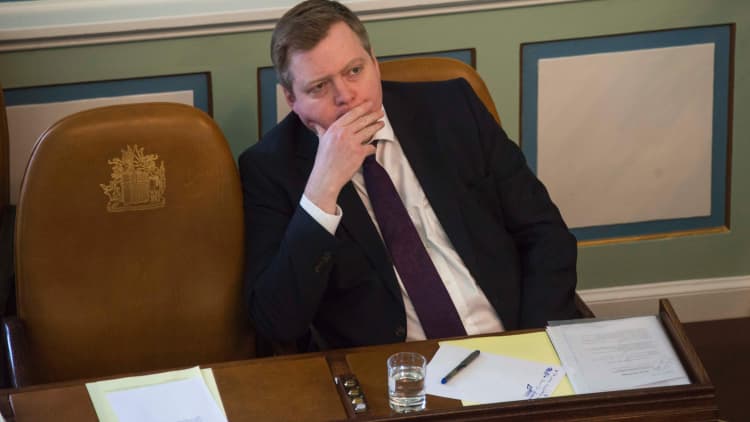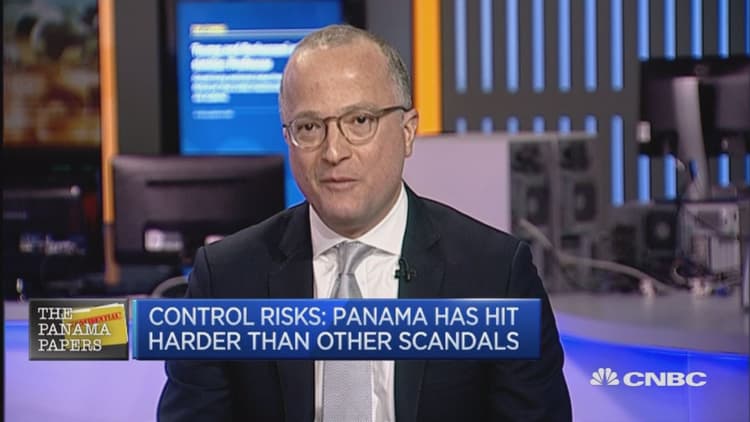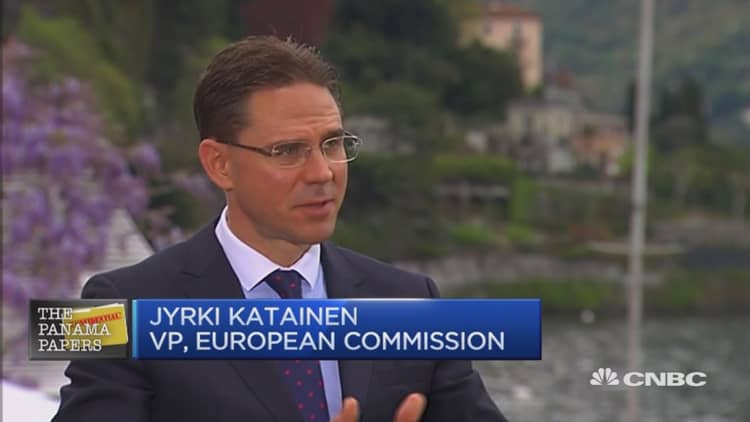


European leaders are scrambling to tighten rules on tax evasion this week as the Panama Papers data dump continues to cause political shockwaves around the world.
David Cameron, the U.K.'s prime minister, is expected to announce measures to combat tax avoidance on Monday and meanwhile Germany and France's finance ministers have vowed to tighten rules against tax havens.
The initiatives come as the European Union's vice-president for Jobs, Growth and Competitiveness likened tax avoidance to a "cancer" that had to be tackled.
"It's a bad disease, it's a cancer of market economies," Jyrki Katainen told CNBC on the sidelines of the Ambrosetti workshop in Italy this weekend.
"The market economy is a fantastic tool to create wealth and to give all citizens the opportunity to distribute the wealth in a fair manner but if you only want to take the fruits and not pay your liabilities in terms of taxes then it's not fair and it's a cancer," he said.
Katainen refused to comment on the circumstances surrounding specific leaders such as David Cameron, the U.K. prime minister who is in hot water over his own tax affairs following the Panama Papers leak.
"All tax avoidance is always bad but especially if you are a democratically-elected leader…You are a leader of the people and you are playing with different rules than your own citizens. It's a matter of confidence, it's a matter of fairness," he said.
Nervous leaders
Katainen's comments come as European leaders move to calm growing public anger over alleged tax avoidance with the global scandal over tax evasion already claiming one victim, the Icelandic prime minister, his job last week.
At the weekend, U.K. Prime Minister David Cameron published a summary of his tax returns in a bid to try to clear his name after accusations of tax avoidance. He also announced this weekend plans to set up a task force to investigate allegations of tax-dodging and money laundering.
The moves followed calls for Cameron to resign in the wake of the Panama Papers scandal in which millions of documents detailing the opaque offshore business dealings of an array of global political leaders, handled by Panamaniam law firm Mossack Fonseca, were leaked last week.
Cameron is under fire for failing to previously disclose that he and his family had invested in an offshore investment fund run by his late father, which was exposed in this week's massive Panama Papers data dump.
According to the documents, Cameron's late father ran an investment vehicle which avoided paying tax in the United Kingdom by having directors hold board meetings in Switzerland and the Bahamas.
After initially refusing to divulge details on his interest in the fund, the U.K. leader revealed to ITV news Thursday that he and his wife had previously held a stake in the offshore trust.
Cameron said he sold the shares before he entering Number 10 in 2010 and had paid all UK taxes due on profits from the £30,000 sale.
On Monday, Cameron is due to face fellow politicians in parliament and is also due to announce that new legislation making companies criminally liable if employees aid tax evasion will be introduced this year, Reuters said.
German plan
Signaling that Europe's leaders are worried about the public backlash against alleged tax evasion by the rich and powerful, as suggested by the Panama Papers, Germany's Finance Minister Wolfgang Scheuble also gave details on Sunday of a plan to combat tax havens.
His counterpart in France, meanwhile, said last week that Panama would be put back on a list of countries blacklisted as "uncooperative tax jurisdictions," a move which Panama's president said was "wrong and unnecessary," according to media reports.
Showing that the Panama affair could still claim more victims, it was reported on Sunday that French tax police searched Societe Generale's headquarters last week as part of an investigation into offshore accounts revealed by the Panama Papers.
The searches on April 5 were a "normal development in the context of such an investigation," a spokesman for the bank told Reuters on Sunday but declined to comment further.


